News » China » Interview: China's development offers "chance for all": French left leader
News » China » Interview: China's development offers "chance for all": French left leader |
- Interview: China's development offers "chance for all": French left leader
- China bans profiteering from religious activity
- China's second icebreaker enters detail design phase
- China upgrades water transport regulations
- China pledges closer defense ties with Finland
- U.S. delegation not entitled to China-Japan mediation: FM
- Communist Party of China to amend Party Constitution
- UCI strips Armstrong of Tour de France titles
- US warships arrive at Cambodian for jointly exercise
- China condemns Beirut car bomb attack
- CPC to amend Party Constitution
- U.S., S. Korean, Chinese, Japanese leaders to attend 21st ASEAN Summit in Cambodia
- Japan-rescued Chinese sailors board Chinese vessel
- Communist Party of China to amend Party Constitution
- High demand for yacht-driving training
- Health Ministry to release information on raw milk
- Draft to ban child plastic surgery without approval
- China liberalizes rural land use to boost development
- Hu Jintao's report at 17th Party Congress
- Hu: Well-off society is top goal
| Interview: China's development offers "chance for all": French left leader Posted: 22 Oct 2012 10:30 AM PDT French left-wing leader Jean-Luc Melenchon said China's development was "a chance for all mankind" in recent exclusive interview with Xinhua. | ||||||
| China bans profiteering from religious activity Posted: 22 Oct 2012 10:16 AM PDT The State Administration for Religious Affairs (SARA) on Monday called on local authorities to "resolutely ban" any acts of profiteering related to religious activity. | ||||||
| China's second icebreaker enters detail design phase Posted: 22 Oct 2012 10:15 AM PDT The detail design of China's second icebreaker will be conducted by a domestic shipbuilding company, according to the Polar Research Institute of China. | ||||||
| China upgrades water transport regulations Posted: 22 Oct 2012 05:45 AM PDT Changes to China's domestic water transport regulations were introduced on Monday in order to promote the healthy development of the water transportation sector. | ||||||
| China pledges closer defense ties with Finland Posted: 22 Oct 2012 05:45 AM PDT China on Monday pledged to seek closer military relations with Finland. | ||||||
| U.S. delegation not entitled to China-Japan mediation: FM Posted: 22 Oct 2012 05:45 AM PDT A U.S. delegation currently visiting Beijing is not entitled to mediate between China and Japan over the Diaoyu Islands dispute, a Foreign Ministry spokesman clarified on Monday. | ||||||
| Communist Party of China to amend Party Constitution Posted: 22 Oct 2012 06:28 AM PDT The Communist Party of China (CPC) is going to amend the Party Constitution at its upcoming 18th national congress scheduled for Nov. 8. | ||||||
| UCI strips Armstrong of Tour de France titles Posted: 22 Oct 2012 06:28 AM PDT Cycling's world governing body UCI on Monday ratified the US Anti-Doping Agency (USADA) decision to strip Lance Armstrong of his seven Tour de France titles. | ||||||
| US warships arrive at Cambodian for jointly exercise Posted: 22 Oct 2012 06:28 AM PDT A USS Vandegrift frigate and two U.S. diving and salvage ships arrived at Cambodia's Sihanoukville Autonomous Port on Monday morning for a five-day naval exercise with the Cambodian Navy. | ||||||
| China condemns Beirut car bomb attack Posted: 22 Oct 2012 06:28 AM PDT A Chinese Foreign Ministry spokesman on Monday condemned a car bomb attack which rocked Beirut of Lebanon recently, and urged timely investigation of the incident. | ||||||
| CPC to amend Party Constitution Posted: 22 Oct 2012 04:26 AM PDT The Communist Party of China (CPC) is going to amend the Party Constitution at its upcoming 18th National Congress scheduled for Nov. 8, according to a meeting of the Political Bureau of the CPC Central Committee on Monday. | ||||||
| U.S., S. Korean, Chinese, Japanese leaders to attend 21st ASEAN Summit in Cambodia Posted: 22 Oct 2012 01:40 AM PDT U.S. President Barack Obama, South Korean President Lee Myung-bak, Chinese Premier Wen Jiabao and Japanese Prime Minister Yoshihiko Noda have already confirmed their participation in the 21st ASEAN Summit and related Summits here on Nov. 15-20, said Cambodia's Foreign Minister Hor Namhong on Monday. | ||||||
| Japan-rescued Chinese sailors board Chinese vessel Posted: 22 Oct 2012 01:10 AM PDT Sixty four Chinese crew members embarked on a Chinese rescue ship on Monday morning after being saved by Japanese rescuers from a boat that caught fire on Saturday in waters near Okinawa, Chinese maritime rescue officials have announced. | ||||||
| Communist Party of China to amend Party Constitution Posted: 22 Oct 2012 02:18 AM PDT The Communist Party of China (CPC) is going to amend the Party Constitution at its upcoming 18th national congress scheduled for Nov. 8. | ||||||
| High demand for yacht-driving training Posted: 22 Oct 2012 02:54 AM PDT The expanding yachting industry in China has helped stoke the demand for yacht-driving courses in Guangzhou, capital of Guangdong province. Guangzhou Maritime College, one of two schools to offer instruction in the subject, saw enrollment in the courses start to pick up quickly in 2010, said Li Dimin, a dean of the college. When started in 2006, the program recruited about four students in one session and is training a dozen in the current one. More than 300 people, after attending 28 sessions at the college, have obtained yacht-driving licenses. "It is obvious that the demand for yacht drivers has become strong in cities around Guangzhou, such as Zhongshan and Shunde in Foshan," Li said. "In the beginning, we thought that yachting was a kind of luxury consumption. But then, people started to change their minds and saw yachting as a source of employment. It's like a driver's license. Before, only rich people were applying for it. But now many people are doing that." In the Pearl River Delta in Guangdong alone, there is a potential demand for 100,000 yacht drivers, Li said, citing an industry estimate. Among those who have taken the course on yacht driving have been yacht owners — who make up more than half of the students — those wanting to work as yacht drivers, those working in maritime design and manufacturing and managers of yacht clubs, said Wang Xinhui, another dean. To ensure the quality of the training, the college has decided to limit the number of trainees who can enroll in each session to 20. Guangdong is well positioned to develop a leisure boating industry. It has a thriving coastal tourism industry, a high per capita GDP, and is close to Hong Kong, Macao, Taiwan and Southeast Asia, which have strong yachting markets, according to a plan released last October by the provincial transportation department. At the end of 2010, Guangdong had eight yacht clubs and six other yacht docks in coastal cities. Five yacht clubs were under construction at the time and those will give the city an additional 1,800 berths when they are completed. The number of yachts in use in Guangdong is expected to exceed 8,000 by 2015. The number of yachts from outside Guangdong that are registered in or visiting Guangdong is predicted to reach 2,000 by that year. To attract tourists to the seaside, the Guangdong provincial government plans to build four yacht bases and two international cruise ports in the province by 2020, according to plans released earlier this year. Authorities in Guangdong and neighboring Hong Kong and Macao are working to ease barriers to yacht travel among those places. The State Council announced in 2009 that regions with the appropriate resources will receive support to develop cruise and yacht tourism. Shu Meng contributed to this story. | ||||||
| Health Ministry to release information on raw milk Posted: 22 Oct 2012 02:54 AM PDT Updated: 2012-10-22 17:13 By Cao Yin ( chinadaily.com.cn) The Ministry of Health has been ordered to release a summary from its National Food Safety Standard Raw Milk conference, according to a verdict from Beijing No 1 Intermediate People's Court. The summary had been requested by a customer who wanted information on raw milk, but the ministry had turned down the request, saying it was beyond what they could release to the public. The court ruled the ministry's reply was short of facts and legal support, Dahe Daily, a newspaper in Henan province, reported on Oct 22. In 2010, the country published its new standard on raw milk, after which Zhao Zhengjun, a customer from Zhenzhou, capital of Henan province, asked the ministry for the summary three times. The ministry said the information that the customer wanted might affect public order and become a burden for social management if it was disclosed, added the report. On Feb 16, Zhao appealed to Beijing No 1 Intermediate People's Court. Related StoriesCheap imports hurt Chinese milk powder producer 2012-09-29 17:31Worker suspected of falsifying milk production dates 2012-09-13 21:28Mengniu to increase sourcing raw milk 2012-08-29 13:21China's milk powder demand drives NZ trade surplus 2012-08-24 14:24 | ||||||
| Draft to ban child plastic surgery without approval Posted: 22 Oct 2012 02:54 AM PDT Updated: 2012-10-22 17:03 ( chinadaily.com.cn) Medical facilities in Guangzhou will be banned from performing plastic surgery on minors without the approval of a parent or guardian, under a draft published by the city government, Guangzhou Daily reported on Monday. However, surgery for medical purposes, like orthodontics or scar treatment, will still be permitted. The southern city has published the draft, which come into effect as early as next June, to solicit public opinion. The draft also requires at least one social worker be deployed to every middle or primary school. The move comes amid reports of a rise in youngsters getting plastic surgery in China. One report suggested that 10 to 20 percent of plastic surgery recipients in Shanghai are minors, a growth of 10 to 15 percent annually due to dreams of fame among youngsters and a more open attitude by parents. There are currently no laws covering plastic surgery on minors, or under 18s, in China. Related StoriesHK woman dies after beauty treatment 2012-10-11 15:05Cosmetic surgery tourism boost during holiday 2012-10-08 10:28China to offer free plastic surgery to heroes 2012-03-27 20:58'Plastic surgery needs higher standard' 2012-03-19 14:04Teenager set on fire in attack to get free care and plastic surgery 2012-03-07 08:04Plastic surgery takes average 7 years off face 2012-02-23 13:16Film school: No plastic surgery 2012-02-16 08:01Couples want matching plastic surgery 2012-02-13 14:58 | ||||||
| China liberalizes rural land use to boost development Posted: 22 Oct 2012 02:54 AM PDT The Communist Party of China (CPC) issued a landmark policy document on Sunday to allow farmers to "lease their contracted farmland or transfer their land use right" to boost the scale of operation for farm production and provide funds for them to start new businesses.
The Decision on Major Issues Concerning the Advancement of Rural Reform and Development was approved by the CPC Central Committee on October 12 at a plenary session. According to the full text of the document, markets for the lease of contracted farmland and transfer of farmland use rights shall be set up and improved to allow farmers to sub-contract, lease, exchange and swap their land use rights, or joined share-holding entities with their farmland. Such transfers of land-use rights must be voluntarily participated by farmers, with adequate payment and in accordance with the law, the CPC Central Committee said. According to domestic law, farmland is collectively owned, but meted out to farmers in small plots in long term leasing contracts. The new measures adopted are seen by economists as a major breakthrough in land reforms initiated by late leader Deng Xiaoping 30 years ago, which will avail farmers of opportunities to conduct scale management and new business operations. When the document was drafted, some have argued that the new policy might create a few landlords and landless farmers who will have no means for a living. And arable lands to be used for non-farming purposes, might threaten the country's food safety.
To ease such fears, the CPC Central Committee also provided in the document that the country would carry out "the most stringent farmland protection system" and urged local authorities to firmly safeguard the 1.8 billion mu (120 million hectares) minimum farmland set line. China is facing a sharp conflict between land supply and demand. The area of arable land shrank 610,100 mu in 2007 to 1.826 billion mu, only slightly above the government's set target. The CPC Central Committee also called on local governments to stick to "the most stringent land conservation system" to strictly control the total scale of the land used for urban development. The government would strive to double the per-capita disposable income of rural residents from the 2008 level to more than 1200 U.S. dollars by 2020, the Party document said. | ||||||
| Hu Jintao's report at 17th Party Congress Posted: 22 Oct 2012 02:54 AM PDT BEIJING -- The following is the full text of Hu Jintao's report delivered at the 17th National Congress of the Communist Party of China (CPC) on Oct. 15, 2007: Hold High the Great Banner of Socialism with Chinese Characteristics and Strive for New Victories in Building a Moderately Prosperous Society in all Respects Report to the Seventeenth National Congress of the Communist Party of China on Oct. 15, 2007 Hu Jintao
Now I would like to make a report to the Seventeenth National Congress of the Communist Party of China (CPC) on behalf of the Sixteenth Central Committee. The Seventeenth Congress is one of vital importance being held at a crucial stage of China's reform and development. The theme of the congress is to hold high the great banner of socialism with Chinese characteristics, follow the guidance of Deng Xiaoping Theory and the important thought of Three Represents, thoroughly apply the Scientific Outlook on Development, continue to emancipate the mind, persist in reform and opening up, pursue development in a scientific way, promote social harmony, and strive for new victories in building a moderately prosperous society in all respects. The great banner of socialism with Chinese characteristics is the banner guiding development and progress in contemporary China and rallying the whole Party and the people of all ethnic groups in the country in our common endeavor. Emancipating the mind is a magic instrument for developing socialism with Chinese characteristics, reform and opening up provide a strong driving force for developing it, and scientific development and social harmony are basic requirements for developing it. Building a moderately prosperous society in all respects is a goal for the Party and the state to reach by 2020, and represents the fundamental interests of the people of all ethnic groups. The world today is undergoing extensive and profound changes, and contemporary China is going through a wide-ranging and deep-going transformation. This brings us unprecedented opportunities as well as unprecedented challenges, with the formeroutweighing the latter. The whole Party must unswervingly hold high the great banner of socialism with Chinese characteristics and lead the people in starting from this new historical point, grasping and making the most of the important period of strategic opportunities, staying realistic and pragmatic, forging ahead with determination, continuing to build a moderately prosperous society in all respects and accelerate socialist modernization, and accomplishing the lofty mission bestowed by the times. I. The Work of the Past Five Years The five years since the Sixteenth Congress was an extraordinary period. In order to accomplish the arduous tasks of reform and development in a complicated and volatile international situation, the Party led the people of all ethnic groups in holding high the great banner of Deng Xiaoping Theory and the important thought of Three Represents, overcoming difficulties and risks, creating a new situation in the cause of socialism with Chinese characteristics and attaining a new realm in adapting Marxism to conditions in China. At its Sixteenth Congress the Party established the important thought of Three Represents as its guide and made the strategic decision to build a moderately prosperous society in all respects. In order to implement the guiding principles of the congress, the Central Committee convened seven plenary sessions, at which it made decisions on and arrangements for major issues of overall significance such as deepening institutional restructuring, improving the socialist market economy, strengthening the governance capability of the Party, drawing up the Eleventh Five-Year Plan (2006-10), and building a harmonious socialist society; and it formulated and applied the Scientific Outlook on Development and other major strategic thoughts. All this helped the Party and the state score great new achievements. Economic strength increased substantially. The economy sustained steady and rapid growth. The GDP expanded by an annual average of over 10%. Economic performance improved significantly, national revenue rose markedly year by year, and prices were basically stable. Efforts to build a new socialist countryside yielded solid results, and development among regions became more balanced. The endeavor to make China an innovative nation registered good progress, with considerable improvement in the country's capacity for independent innovation. Notable achievements were scored in the construction of infrastructure including energy, transport and telecommunications facilities and other key projects. Manned spaceflights were successfully conducted. Fresh progress was registered in energy, resources, ecological and environmental conservation. The Tenth Five-Year Plan (2001-05) was fulfilled successfully and implementation of the eleventh is in smooth progress. Major breakthroughs were made in reform and opening up. Comprehensive reforms in rural areas gradually deepened; agricultural tax, livestock tax and taxes on special agricultural products were rescinded throughout the country; and policies were constantly strengthened to support and benefit agriculture, rural areas and farmers. Significant headway was made in reform of the state assets management system, state-owned enterprises, banking, public finance, taxation, investment, pricing, and the system for managing science and technology. The non-public sector of the economy grew stronger. A sound market system was being put in place, macroeconomic regulation continued to improve, and transformation of government functions was accelerated. The total volume of imports and exports increased sharply. Solid steps were taken in implementing the "go global" strategy, and the open economy entered a new stage of development. Living standards improved significantly. Both urban and rural incomes increased considerably, and most families had more property than before. The system of subsistence allowances for urban and rural residents was basically in place, guaranteeing basic living conditions for the poor. Residents improved their consumption patterns, had increasingly better food, clothing, housing, transport and other daily necessities, and enjoyed markedly improved public services. Fresh progress was registered in improving democracy and the legal system. Political restructuring progressed steadily. Constant improvement was made in the system of people's congresses, the system of multiparty cooperation and political consultation under the leadership of the CPC and the system of regional ethnic autonomy. Primary-level democracy increased its vitality. The cause of human rights witnessed sound development. The patriotic united front grew stronger. A socialist law system with Chinese characteristics was basically in place. The rule of law was effectively implemented as a fundamental principle. Reform of the government administration system and the judicial system continued to deepen. A new situation was created in cultural development. Efforts to establish the system of socialist core values made steady headway and marked achievements were scored in the Project to Study and Develop Marxist Theory. Extensive efforts were made to raise ideological and ethical standards and the whole of society became more culturally advanced. Cultural restructuring made important progress, cultural programs and the cultural industry developed rapidly, and the people enjoyed a richer cultural life. Fresh progress was made in public fitness programs and competitive sports. Social development proceeded in an all-round way. Education of various kinds and at different levels developed rapidly. Free compulsory education was made available in all rural areas. More job opportunities were created. The social security system was strengthened. The battle against SARS came to a great victory. The public health system and basic medical care constantly improved, contributing to better health of the people. Social management improved step by step. Social stability was ensured and the people lived and worked in peace and contentment. Historic achievements were scored in the development of national defense and the armed forces. The revolution in military affairs with Chinese characteristics was accelerated. The armed forces were reduced by 200,000 troops. Efforts were intensified in all respects to make the armed forces more revolutionary, modernized and standardized, which notably increased their capacity to accomplish their historical missions at this new stage in the new century. Work related to Hong Kong, Macao and Taiwan affairs was intensified. Hong Kong and Macao maintained their prosperity and stability and developed closer economic partnership with the mainland. Political parties on both sides of the Taiwan Straits started communication, and cross-Straits visits as well as economic and cultural exchanges reached a new high. The Anti-Secession Law was enacted to resolutely safeguard China's sovereignty and territorial integrity. Major progress was made in all-directional diplomacy. Pursuing an independent foreign policy of peace, China energetically carried out diplomatic activities, enhanced exchanges and cooperation with other countries in various fields and played a major constructive role in international affairs. This created a favorable international environment for building a moderately prosperous society in all respects. The great new undertaking to build the Party made solid progress. Endeavors to strengthen the Party's governance capability and vanguard nature were intensified. Efforts to make theoretical innovations and arm Party members with the achievements proved successful. The campaign to educate Party members to preserve their vanguard nature yielded substantial results. Intra-Party democracy continued to expand. Major headway was made in strengthening the Party's leading bodies and the ranks of its cadres, and especially in educating and training cadres. Work in relation to talented personnel was strengthened. Efforts were stepped up to reform the cadre and personnel system and make innovations in the organizational system. Remarkable results were achieved in improving the Party's style of work, upholding integrity and combating corruption. While recognizing our achievements, we must be well aware that they still fall short of the expectations of the people and that there are still quite a few difficulties and problems on our way forward. The outstanding ones include the following: Our economic growth is realized at an excessively high cost of resources and the environment. There remains an imbalance in development between urban and rural areas, among regions, and between the economy and society. It has become more difficult to bring about a steady growth of agriculture and continued increase in farmers' incomes. There are still many problems affecting people's immediate interests in areas such as employment, social security, income distribution, education, public health, housing, work safety, administration of justice and public order; and some low-income people lead a rather difficult life. More efforts are needed to promote ideological and ethical progress. The governance capability of the Party falls somewhat short of the need to deal with the new situation and tasks. In-depth investigations and studies have yet to be conducted on some major practical issues related to reform, development and stability. Some primary Party organizations are weak and lax. A small number of Party cadres are not honest and upright, their formalism and bureaucratism are quite conspicuous, and extravagance, waste, corruption and other undesirable behavior are still serious problems with them. We must pay close attention to these problems and continue our efforts to solve them. To sum up, the past five years was a period in which substantial progress was made in reform, opening up and building a moderately prosperous society in all respects. During this period, China's overall strength grew considerably and the people enjoyed more tangible benefits. China's international standing and influence rose notably. The creativity, cohesion and combat effectiveness of the Party increased significantly, and the whole Party and the people of all ethnic groups became more united. Facts have proved that the major policy decisions made by the Central Committee at and since the Sixteenth Congress are perfectly correct. Our achievements over the past five years are attributed to the concerted efforts of the whole Party and the people of all ethnic groups. On behalf of the Central Committee, I wish to express our heartfelt thanks to the people of all ethnic groups, the democratic parties, people's organizations and patriots from all walks of life, to our compatriots in the special administrative regions of Hong Kong and Macao and in Taiwan as well as overseas Chinese nationals, and to our foreign friends who care about and support China's modernization drive! | ||||||
| Hu: Well-off society is top goal Posted: 22 Oct 2012 02:54 AM PDT
"In keeping with the changes in domestic and international situations and in light of the expectations of people of all ethnic groups for a better life, we must set new and higher requirements for China's development based on the goal of building a moderately prosperous society in all respects set at the 16th Party congress," Hu said in his report to the 17th CPC National Congress which opened in Beijing on Monday.
To this end, he added, China will continue to power the engine of economic growth by quadrupling the per capita value of the 2000 gross domestic product (GDP) by 2020. But the rapid growth will be subject to the proviso of reduced consumption of resources and greater efforts in environment protection, Hu said, proposing that a conservation culture be promoted while moving to build a well-off society. The country will considerably increase the proportion of renewable energy in total energy consumption, bring the discharge of major pollutants under effective control and significantly improve ecological and environmental quality, Hu added. Meanwhile, the nation will persist in reform and opening up, accelerate social development with the focus on improving people's livelihood, with particular stress on education, employment and social security. It will also manage to narrow the widening income gap, expand democracy, prevent and check corruption, modernize its armed forces and enhance the "soft power" of its culture, Hu noted. More than 2,200 delegates from across the country are attending the congress, the most important political event that will chart a roadmap for development in the next five years. The congress, scheduled to last until Sunday, is set to elect the Party's 17th Central Committee that will decide the CPC's new leadership lineup for the coming few years, and elect a new Central Commission for Discipline Inspection. A draft amendment to the Party Constitution is expected to be approved to embody the Scientific Outlook on Development and other new achievements in the Party's theoretical innovation and progress in practice. The Scientific Outlook on Development, initiated by the 16th CPC Central Committee in 2003, is part of the theories of socialism with Chinese characteristics that stands alongside Deng Xiaoping Theory and the important thought of Three Represents. On foreign policy, Hu said the country will unswervingly follow the path of peaceful development. China opposes terrorism, hegemonism and power politics in any form and does not engage in an arms race or pose a military threat to any country, and will never seek hegemony or engage in expansion, he said. Noting the country cannot develop in isolation from the rest of the world, and nor can the world enjoy prosperity and stability without China, Hu said "China will never seek benefits for itself at the expense of other countries or shift its troubles onto others". Sharing opportunities for development and rising to challenges together to further the cause of peace and development of humanity is in the fundamental interests of the people of all countries, Hu said. | ||||||
| You are subscribed to email updates from Update » News » China To stop receiving these emails, you may unsubscribe now. | Email delivery powered by Google |
| Google Inc., 20 West Kinzie, Chicago IL USA 60610 | |

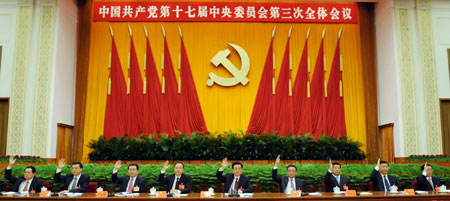




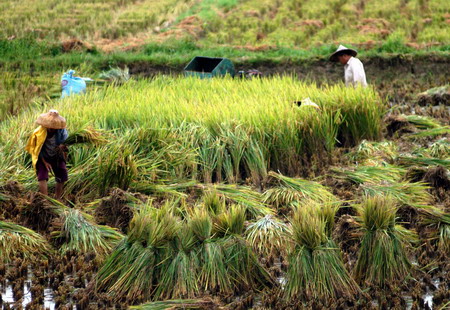
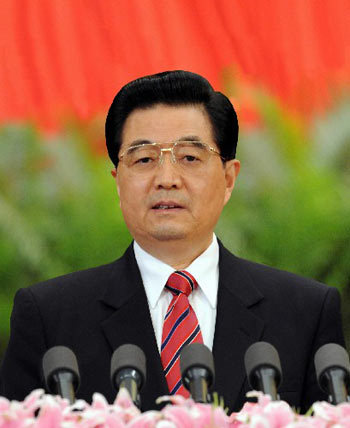
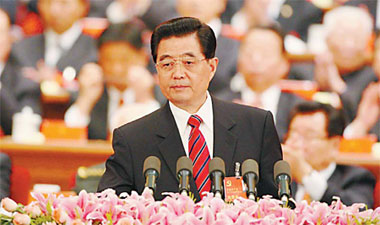
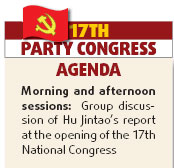
Comments